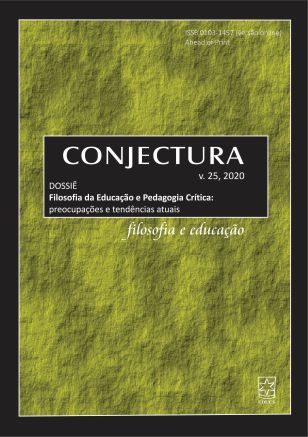Are we living the end of democracy? A defence of the ‘free’ time of the university and school in an era of authoritarian capitalism
DOI:
https://doi.org/10.18226/21784612.v25.dossie.1Resumo
In this article I address education beyond individualism, elitism and instrumentalism and instead understand education as central for a democratic way of life. I discuss the role of education in the making of democratic forms of life in the university, in the school as well as in other contexts outside institutions. I argue for the importance of defending the “free time” of the university and school against a “time of production” as a defining characteristic of university and school. I will show how a time of production undermine the very possibility of education, and which therefore also tends to negate pluralist democracy.
Referências
Arnstad, H. (2016). Älskade fascism. De svartbruna rörelsernas ideologi och historia. [Beloved fascism. The ideology and history of the black brown movements] Stockholm: Norstedts.
Bauman, Z. (1999). In search of politics, Cambridge: Polity Press.
Berardi, F. (2017). Futurability. The age of impotence and the horizon of possibility. London: Verso.
Biesta,G.J.J. (2018). What if? Art education beyond expression and creativity. In C.
Naughton, G.J.J. Biesta, D.R. Cole (Eds)., Art artist and pedagogy: Philosophy and the arts in education. New York: Routledge.
Biesta, G.J.J. (2017). The rediscovery of teaching. London: Routledge
Biesta, G.J.J. & Säfström, C.A. (2011). A manifesto for education. Policy Futures in Education, 9:5, 540-547.
Bollfrass A. & Shaver, A., (2015). The effects of temperature on political
violence: Global evidence at the subnational level, PloS One. 2015; 10(5): e0123505.
Published online 2015 may 20. Doi: 10:1371/journal.pone.0123505.
Butler, J. (2015). Notes towards a performative theory of assembly. Harvard: Harvard University Press.
Castoriadis, C., (1987). The imaginary institution of society. Malden, MA: Polity Press
Dewey, J. (1966). Democracy and education. An introduction to the philosophy of education. New York: The Free Press
Fraser, N. (1990). Rethinking the Public Sphere: A Contribution to the Critique of Actually Existing Democracy. Social Text, 25:26, 56-80.
Giroux, H. (2018). American nightmare: Facing the challenge of fascism. San Francisco: City Lights Books.
Jaeger, W. (1939/1965). Paideia. The ideas of Greek culture. Vol 1. Archaic Greece the minds of Athens. New York, Oxford: Oxford University Press.
Lynch, K. (2006). Neo-liberalism and marketisation: The implications for higher education.
European Educational Research Journal, 5:1, 1-17.
Masschelein, J. & Simons, M. (2015). Education in times of fast learning: the future of the school. Ethics and Education, 10:1, 84-95.
Masschelein, J. & Simons, M. (2013). In defence of the school. A public issue. Leuven: E-ducation, Culture & society Publishers.
Olssen & Peters, M. (2005). Neoliberalism, higher education and the knowledge economy: from the free market to knowledge capitalism, Journal of Education Policy, 20:30, 313-345.
Orellana P.D. & Michelsen, N. (1919). The new right: how a Frenchman born 150 years ago inspired contemporary nationalism. New Statesman, 3 July, 2019. https:/www.newstatesman.com/world/2019/07/new-right-how- frenchman—born-150-years—ago-inspired-contemporary-nationalsim.
Poulantzas, N. (1979). Fascism and dictatorship. The third international and the problem of fascism. (Translated by Judith White). London: Verso Books.
Rancière, J. (2007). On the shore of politics. London: Verso
Rancière, J. (2009). Hatred of democracy. London: Verso
Rancière, J. (2004). The politics of aesthetics: The distribution of the sensible. London & New York. Continuum.
Rancière, J. (1999). Disagreement. Politics and philosophy. Minneapolis, London: University of Minnesota Press.
Rancière, J. (1991). The ignorant schoolmaster. Five lessons in intellectual emancipation. Stanford: Stanford University Press.
Ruitenberg, C. (2008). What if democracy really matters. Journal of Educational Controversy. 3:1, article 11: https//cedar.wwu.edu/jec/vol3/iss1/11.
Suissa, J. (2016). Reflections in the ”counter” in educational counterpublics. Educational Theory, 66:6, 769-786.
Säfström, C.A. (In press). Paideia and the search for freedom in the public of today. Journal of Philosophy and Education.
Säfström, C.A., (2018a). Liveable life, educational theory and the imperative of constant change. https://www.youtube.com/watch?v=xiV-wPID3QY
Säfström, C.A. (2018b). Liveable life, educational theory and the imperative of constant change. European Educational Research Journal, 17:5, 1-10. DOI:10.1177/1474904118784480.
Säfström, C.A. (2018c). “A pedagogy of the depressed”. SCAPE-Symposium, November 11-14, Maynooth University.
Säfström, C. A., (2014). When the wrong people speak: on bullying as a political problem for democratisation in schools. In Biesta, G.j.j., De Bie, M. & Wildemeersch, D. eds. 2014. Civil learning, democratic citizenship and the public sphere. Dordrecht/Boston: Springer.
Säfström, C.A. (2005). Skillnadens pedagogik. Nya trender i den pedagogiska teorin. [A pedagogy of difference. New trends in educational theory. Lund: Studentlitteratur.
Säfström, C.A., (2005b). The European knowledge society and the diminishing state control of education: the case of Sweden. Journal of Education Policy, 20:5, 583-593.
Säfström, C.A. & Månsson, N. (2015). The ontology of learning, or teaching the non-person to learn. Interaccoes, 11:37, 66-82.
Todd, S. (2003) Learning from the Other: Psychoanalysis and ethical possibilities in education. New York: SUNY Press.
Traverso, E. (2019). The new faces of fascism. Populism and the far right. London: Verso.
Warner, M. (2002). Publics and Counter-publics. Public Culture, 14:1, 49-90.
von Wright, G. (1988). Vetenskapen och förnuftet. Ett försök till orientering. [Science and Reason. An Attempt to Orientation] Stockholm: Månpocket.
Downloads
Publicado
Como Citar
Edição
Seção
Licença
1. A publicação dos originais implicará a cessão dos direitos autorais à revista Conjectura.
2. Os textos não poderão ser reproduzidos sem autorização da revista depois de aceitos.

Este trabalho está licenciado com uma Licença Creative Commons - Atribuição 4.0 Internacional.









